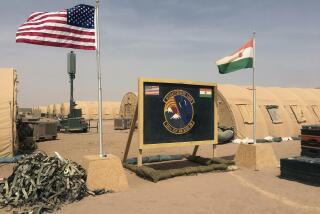Observers Approve Return of Peace to Sierra Leone--With Reservations
- Share via
NAIROBI, Kenya — The ouster of a military junta in Sierra Leone by a Nigerian-led peacekeeping force demonstrates that Africans can take care of problems on their own without intervention from outside the continent, analysts said Tuesday.
Although the mission was accomplished last week with force and not diplomacy, its supporters say the goal of the military campaign was honorable and rare: to restore, not to overthrow, an elected African government.
But skeptics are still wary of the role of Nigeria--Africa’s most populous nation, with more than 100 million people--in the peacekeeping operation. They ask if what Nigeria really wants is to occupy tiny, cash-strapped Sierra Leone and pillage its remaining resources, chiefly its diamonds. There is also concern that Nigeria might get bogged down in the West African nation as it struggles to restore law and order and disarm remnants of rebel factions reportedly scattered throughout the country.
“People have said that Africa should take its matters into its own hands, and it has,” said Ahmed Rajab, editor of Africa Analysis, a London-based publication that reports on the continent’s financial and political trends. “That’s a plus.”
Jean Herskovits, a professor of African history at the State University of New York at Purchase and a longtime expert on regional security issues in Africa, agreed, saying of the intervention: “It is a genuine blessing at a time when the West is not going to do anything.”
Indeed, Western nations have shown their reluctance recently to get involved in African conflicts and instead have been promoting the idea of Africans solving their own problems. Last year, the United States launched an initiative to fund and train African troops from several nations for an African Crisis Response Force.
*
An official in Washington said Tuesday that the United States supported the Sierra Leone peacekeeping effort and now will work with the government of President Ahmad Tejan Kabbah, who was deposed in May after barely six months in office by a military coup led by Lt. Col. Johnny Paul Koroma.
The United Nations and the Organization of African Unity both condemned the coup and the brutal rule that followed, and they authorized an effort under the military wing of the Economic Community of West African States to restore Kabbah and peace in Sierra Leone.
This African effort was unusual, although Tanzanian forces did cross the border into Uganda in 1979, leading to the overthrow of dictator Idi Amin and later to elections won by former President Milton Obote.
The Sierra Leone peacekeepers--who also won the support of the kamajors, militias with close links to the ousted government--initially sought to force out the Koroma junta with air raids on military sites in the capital, Freetown. That effort failed.
But when Koroma started to back away from an agreement signed in October in which he vowed to give up power by April 22, Nigeria led last week’s stepped-up military campaign involving thousands of troops. At least 100 people were killed, hundreds were injured, and thousands were forced to flee, though exact figures are unavailable.
Nigeria, which played a significant role in helping to end neighboring Liberia’s seven-year war, has been eager to take credit for the ouster of Sierra Leone’s junta.
Some analysts say its success in Sierra Leone will let the regime of Gen. Sani Abacha deflect increasing criticism of its dictatorial policies and poor human rights record and of the economic corruption and drug trade in Nigeria.
But J. Z. Gana, a Nigerian diplomat in Nairobi, said: “We believe not only is this [mission] a success for Nigeria but a success for the entire West African region. We just hope the process of democratization will take place very soon, so that we see Kabbah return to power and we can pull out of there.”
Gana dismissed critics who claim that Nigeria is interested more in exploiting Sierra Leone than in restoring democracy there, saying, “People who did not expect us to succeed, they will look for every excuse to criticize us.”
Still, many observers are puzzled about Nigeria’s insistence on the ouster of Sierra Leone’s junta, since the present Nigerian regime itself came to power via a coup and has been hinting that it may not--as it has promised--hand over power to a civilian authority later this year.
But backers of the Sierra Leone intervention argue that Abacha can ill afford to ignore the issue of regional stability, for reasons of trade and security. Nigeria does not need a flood of refugees from war-torn countries in the region, these observers say.
*
“They have a vision of themselves as players,” said Herskovits. “If their internal situation was different, no one would have any problem recognizing that.”
Now, though, Nigeria and its African allies face a daunting task in trying to bring a lasting peace to Sierra Leone, a former British colony that has been racked by three coups since 1992.
Sierra Leone--to which the U.S. contributed $37.5 million in humanitarian aid in 1997--is one of the five poorest countries in Africa, and an embargo imposed after the coup has caused further devastation there. Thousands of foreign businesspeople and senior officials fled when the junta took power.
While Kabbah is expected to return to Freetown in the next few weeks, the West African peacekeepers in the destroyed capital have had to struggle to contain vigilante gangs bent on wreaking revenge on supporters of the ousted regime.
The peacekeepers’ conduct has been commendable, observers say.
“They have been like gentlemen,” said one international relief worker based in the Guinean capital, Conakry, but recently returned from Freetown. “They’ve been quick, very efficient and effective. At the moment, they’re on their best behavior.”
More to Read
Sign up for Essential California
The most important California stories and recommendations in your inbox every morning.
You may occasionally receive promotional content from the Los Angeles Times.














